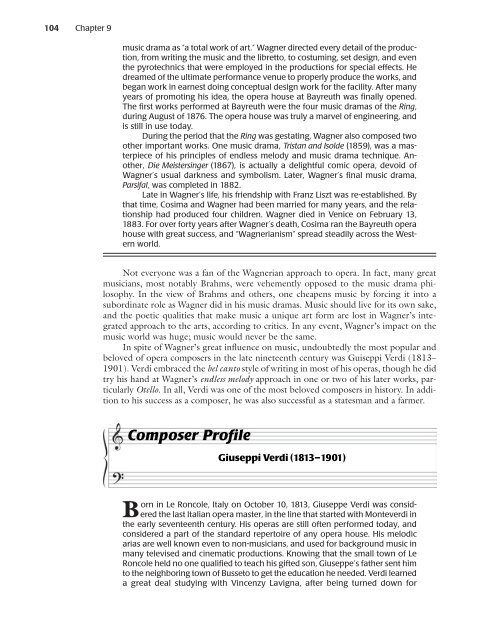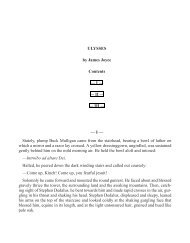Composer Profile - Activefolio
Composer Profile - Activefolio
Composer Profile - Activefolio
Create successful ePaper yourself
Turn your PDF publications into a flip-book with our unique Google optimized e-Paper software.
104 Chapter 9<br />
music drama as “a total work of art.” Wagner directed every detail of the production,<br />
from writing the music and the libretto, to costuming, set design, and even<br />
the pyrotechnics that were employed in the productions for special effects. He<br />
dreamed of the ultimate performance venue to properly produce the works, and<br />
began work in earnest doing conceptual design work for the facility. After many<br />
years of promoting his idea, the opera house at Bayreuth was finally opened.<br />
The first works performed at Bayreuth were the four music dramas of the Ring,<br />
during August of 1876. The opera house was truly a marvel of engineering, and<br />
is still in use today.<br />
During the period that the Ring was gestating, Wagner also composed two<br />
other important works. One music drama, Tristan and Isolde (1859), was a masterpiece<br />
of his principles of endless melody and music drama technique. Another,<br />
Die Meistersinger (1867), is actually a delightful comic opera, devoid of<br />
Wagner’s usual darkness and symbolism. Later, Wagner’s final music drama,<br />
Parsifal, was completed in 1882.<br />
Late in Wagner’s life, his friendship with Franz Liszt was re-established. By<br />
that time, Cosima and Wagner had been married for many years, and the relationship<br />
had produced four children. Wagner died in Venice on February 13,<br />
1883. For over forty years after Wagner’s death, Cosima ran the Bayreuth opera<br />
house with great success, and “Wagnerianism” spread steadily across the Western<br />
world.<br />
Not everyone was a fan of the Wagnerian approach to opera. In fact, many great<br />
musicians, most notably Brahms, were vehemently opposed to the music drama philosophy.<br />
In the view of Brahms and others, one cheapens music by forcing it into a<br />
subordinate role as Wagner did in his music dramas. Music should live for its own sake,<br />
and the poetic qualities that make music a unique art form are lost in Wagner’s integrated<br />
approach to the arts, according to critics. In any event, Wagner’s impact on the<br />
music world was huge; music would never be the same.<br />
In spite of Wagner’s great influence on music, undoubtedly the most popular and<br />
beloved of opera composers in the late nineteenth century was Guiseppi Verdi (1813–<br />
1901). Verdi embraced the bel canto style of writing in most of his operas, though he did<br />
try his hand at Wagner’s endless melody approach in one or two of his later works, particularly<br />
Otello. In all, Verdi was one of the most beloved composers in history. In addition<br />
to his success as a composer, he was also successful as a statesman and a farmer.<br />
<strong>Composer</strong> <strong>Profile</strong><br />
Giuseppi Verdi (1813–1901)<br />
B orn in Le Roncole, Italy on October 10, 1813, Giuseppe Verdi was considered<br />
the last Italian opera master, in the line that started with Monteverdi in<br />
the early seventeenth century. His operas are still often performed today, and<br />
considered a part of the standard repertoire of any opera house. His melodic<br />
arias are well known even to non-musicians, and used for background music in<br />
many televised and cinematic productions. Knowing that the small town of Le<br />
Roncole held no one qualified to teach his gifted son, Giuseppe’s father sent him<br />
to the neighboring town of Busseto to get the education he needed. Verdi learned<br />
a great deal studying with Vincenzy Lavigna, after being turned down for



